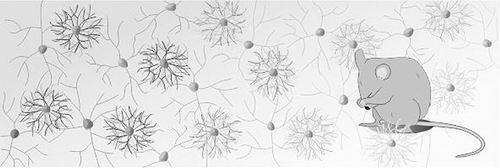Scientists propose new ideas for dealing with obsessive-compulsive disorder and Huntington's disease
Scientists propose new ideas for dealing with obsessive-compulsive disorder and Huntington's disease
October 15, 2018 Source: Chinese Journal of Science and Technology
Window._bd_share_config={ "common":{ "bdSnsKey":{ },"bdText":"","bdMini":"2","bdMiniList":false,"bdPic":"","bdStyle":" 0","bdSize":"16"},"share":{ }};with(document)0[(getElementsByTagName('head')[0]||body).appendChild(createElement('script')) .src='http://bdimg.share.baidu.com/static/api/js/share.js?v=89860593.js?cdnversion='+~(-new Date()/36e5)];
Astrocyte calcium regulates neural circuits and behavior in mice. Yu Xinzhu for the picture
It is good to love clean, but it is not necessary to have cleanliness. The research team at the University of California, Los Angeles (UCLA) moved a little in the brain of mice, and the washing of these mice became completely unstoppable.
The researchers said their experiments demonstrated that astrocytes in the striatum of the brain help control obsessive-compulsive behavior in mice. The study was recently published in the journal Neuron.
Moving the striatum, washing your face is difficult
The striatum is one of the basal ganglia of the brain, which has the function of regulating muscle tension and coordinating various fine and complex movements. As early as 2007, Feng Guoping, a Chinese professor at Duke University, published a paper on Nature, which first reported the relationship between striatum and obsessive-compulsive disorder.
Feng Guoping found that when a protein was missing from the striatum, the mouse repeatedly scrubbed his face until the blood was not broken, and he was also anxious. This symptom can be improved by gene therapy.
In a recent study, the UCLA neurobiology professor Baljit Khakh team focused on the calcium signal of striatal astrocytes.
The brain is made up of many different types of cells, with astrocytes accounting for 40% to 60%. Astrocytes have multiple forms of calcium signaling.
Yu Xinzhu, the first author of the thesis and a postdoctoral fellow at UCLA, told the reporter of the Chinese Journal of Science and Technology: "People still have little understanding of the function of astrocyte calcium signaling. One of the major obstacles facing scientists is that it is difficult to These signals are attenuated at specific developmental stages and specific brain regions."
This time, the Khakh team developed an ingenious method that specifically attenuated astrocyte calcium signaling in the striatum of adult mice. Compared with the control group, the treated mice performed equally well in tests related to anxiety and exercise capacity, but when placed in an open space or in a clean room, they tend to hide in the corner and wash hard. dress up.
Not to be ignorant, the mice in the treatment group spent 450% of their time on self-modification.
Dealing with obsessive-compulsive disorder requires new ideas
The washing behavior of mice is an instinctive behavior controlled by the striatum of the brain. The Khah team believes that excessive self-modification is associated with an obsessive-compulsive phenotype.
"OCD is a habitual behavior caused by cognitive impairment. For example, a person clearly knows that the door is locked at the level of consciousness, or can't control himself to go back and check it three times and five times." Kunming Institute of Animal Science, Chinese Academy of Sciences, who did not participate in the study. Researcher Xu Lin explained to the reporter of the Chinese Journal of Science and Technology that "the striatum is closely related to the formation of 'habits'."
Human obsessive-compulsive disorder is associated with brain structures such as the cerebral cortex. Scientists have also discovered many areas of the brain that may affect compulsive behavior. However, currently available treatment options do not produce the desired results for 40% to 60% of patients with obsessive-compulsive disorder. "It is necessary for scientists to start from a new way of thinking and reveal the internal mechanism of obsessive-compulsive disorder. Our work proves that astrocytes are involved in the pathogenesis of obsessive-compulsive disorder and point out a potential therapeutic direction." Yu Xinzhu said.
In another well-known neurological disease, Huntington's disease, patients also exhibit compulsive symptoms at the earliest. If you artificially develop a model mouse with Huntington's disease, these mice will have obsessive-compulsive behavior, the specific performance is to constantly organize their own instruments.
So, is the "smelly" behavior of Huntington's chorea mice related to the calcium signal of astrocytes?
The answer is yes, and this behavior can be alleviated by a blocker associated with a critical process of astrocyte calcium signaling. "This is interesting." Xu Lin said, "The researchers found that the forced behavior of two different sources in mice has a very similar internal physiological mechanism."
Does this mean that forced behavior, whether caused by Huntington's disease or other causes, may interfere with the calcium signal that affects astrocytes?
Continue to deepen and strive for the benefit of patients
"Our work for the first time links mental disorders to changes in astrocytes in specific brain circuits." Yu Xinzhu said, "We expect this result to be applied in clinical medicine."
Xu Lin said he hopes to see the results of a study on the source of calcium signals in astrocytes. "If we know where the calcium signal comes from, it may regulate its source, which may make it easier to regulate the joint activities of nerves and glial cells, and thus more promising for clinical applications."
For the Khakh team, their work will continue to go deeper. Yu Xinzhu said: "We are currently studying the role of astrocytes in other mental disorders. We have also developed new transgenic mice that will enable us to study whole brain astrocytes at different developmental stages. The overall function."
Clinic Nitrile Gloves,Nitrile Gloves Small,Medical Gloves Unsterilized,Nitrile Gloves Powder Free Latex Free
Puyang Linshi Medical Supplies Co., Ltd. , https://www.linshimedicals.com